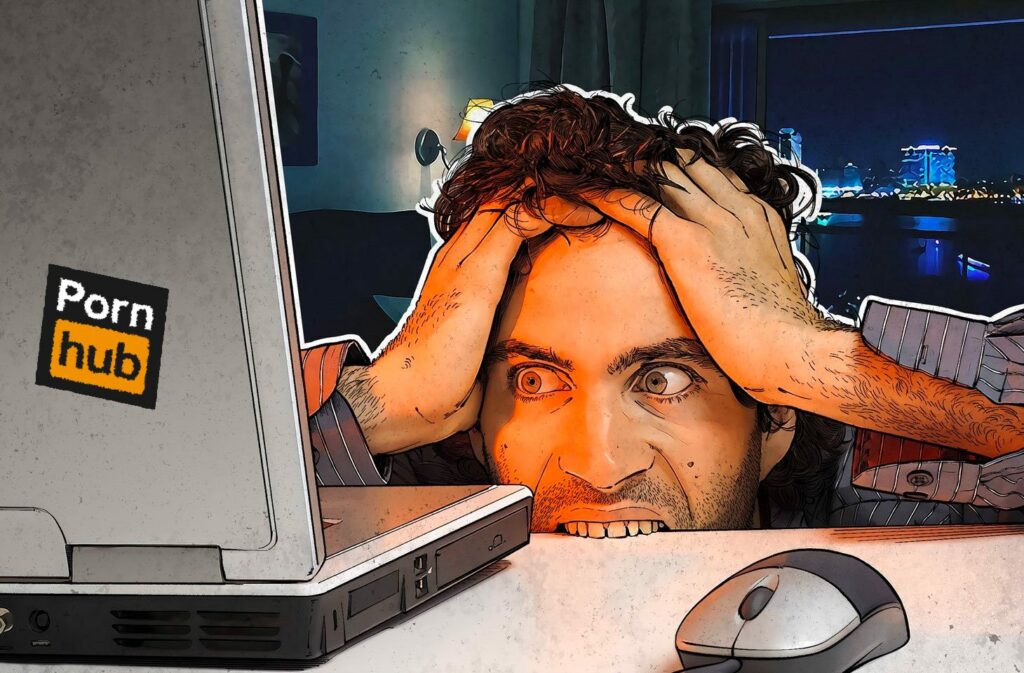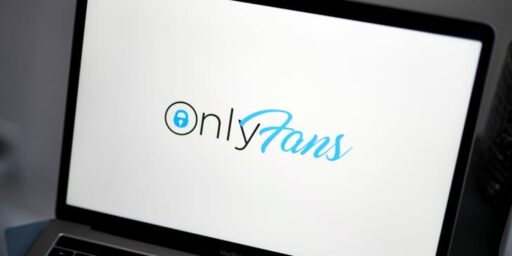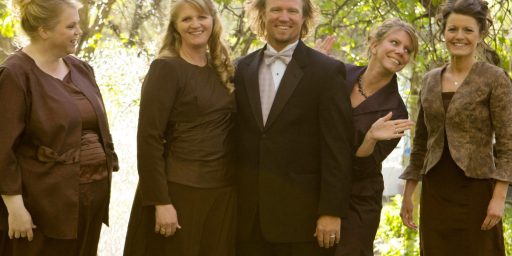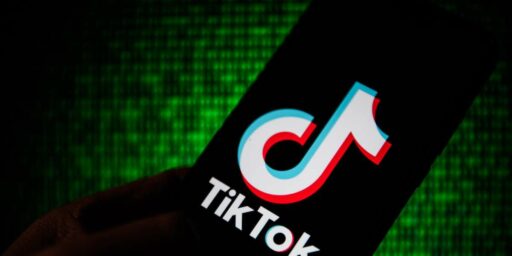Pornhub Blocks Mississippi, Virginia, and Utah Over Porn Crackdowns
You can't fire me, I quit!

TechCrunch (“Pornhub blocks access in Mississippi, Virginia and Utah amid changing laws“):
Pornhub is blocking access from users in Mississippi, Virginia and Utah, which have recently passed laws that require age verification to access adult websites.
Similar legislation went into effect in Louisiana at the start of the year. To comply, Pornhub required visitors to verify their age with the LA Wallet app, a digital wallet for Louisiana state driver licenses.
“Since then, our traffic in Louisiana dropped approximately 80 percent,” Pornhub wrote in a statement. “Those people did not stop looking for porn. They just migrated to other corners of the internet that don’t verify age, that don’t follow the law, that don’t take user safety seriously, and that often don’t even moderate content.”
Internet privacy advocates have long been critical of these age checks, which require users to share personal information like their government ID in order to use the internet. It’s not all that uncommon for hackers to breach government databases, which calls into question just how secure these age verification tools are. Laws like these are becoming more widespread; related legislation will go into effect in Texas and Montana by 2024.
Instead of using age checks in impacted states, Pornhub has opted for a different approach, barring access from those states altogether. If you try to navigate to Pornhub in states like Mississippi, Virginia or Utah, you’ll see adult star Cherie DeVille explain these risks in a safe-for-work video.
“While safety and compliance are at the forefront of our mission, giving your ID card every time you want to visit an adult platform is not the most effective solution for protecting our users, and in fact, will put children and your privacy at risk,” DeVille says.
On the performer side, Pornhub requires adult actors to prove their age and identity to cut down on nonconsensual content and child sexual abuse material (CSAM). Enacted in 2020, this policy is far from perfect, and Pornhub remains at the center of several lawsuits regarding CSAM. But most porn sites are even less regulated than Pornhub. If consumers are required to hand over legal documents in order to watch porn, they will likely seek out other, less moderated sites (… or a VPN).
In its statement, Pornhub proposes that on-device age verification is the solution to the privacy issues inherent in online age checks.
“Many devices already offer free and easy-to-use parental control features that can prevent children from accessing adult content without risking the disclosure of sensitive user data,” Pornhub wrote. Still, there are security challenges with this potential solution, as parents may not be savvy enough to prevent children from bypassing these features.
I live in Virginia and had no idea until I started seeing reports like this one that we were considering, much less passed, such a law. But sure enough, we did.
Washingtonian (“Virginia Is About to Require Age Verification to View Porn. Guess Which State Is Tops for Searching for Information About VPNs?“):
On July 1, sites that display adult content will have to check the ages of people in Virginia who access them. Pornhub has blocked users in Virginia. And perhaps not coincidentally, Google Trends data show that Virginia is now the top state in the U.S. for searching for information about virtual private networks, or VPNs.
Virginia state Senator Bill Stanley, who sponsored the bill, is on vacation this week, his law office told Washingtonian when we called to ask for comment. In the past, he’s spoken about protecting children from adult material and said he was “pretty confident” that age-verification services would not “put users’ personal information at risk.” The office of Virginia’s attorney general, Jason Miyares, didn’t respond to a request for clarification but the law doesn’t appear designed to be enforced by the state: It appears to create a “private right of action” that would allow individual litigants to sue if they felt they, or more likely their children, had been harmed by viewing such content online.
The sudden interest in VPNs—services that encrypt users data online, masking information like one’s location—isn’t a surprise to Mike Stabile, a spokesperson for the Free Speech Coalition, a trade group for the adult-entertainment industry. “A lot of this is magical thinking,” he says of age-verification laws in Virginia, Utah, and Louisiana. Virginia doesn’t have a statewide digital-ID system like Louisiana does, and while independent age-verification systems do exist, they’re geared toward people who are uploading adult material and are expensive and intensive.
Consumers, Stabile says, are often hesitant to use such services because they worry about privacy—few people are wild about the idea of uploading a photo of their driver’s license to any website, he argues. And besides being easy to get around, laws like Virginia’s will drive users toward sites based outside the US that don’t have to worry about them. The cost of verification can be exorbitant for platforms that want to comply—in Louisiana, verification costs about 65 cents per user, which comes to $650,000 per month for a site with a million users. “That’s a business-ending cost,” he says. Traffic to adult sites in Utah and Louisiana has dropped to “single digit percentages of what it was before.”
He argues that chilling effect is likely the point: Virginia’s law “sailed through” the General Assembly before it was signed by Governor Glenn Youngkin, Ben Paviour reports for the public media newsroom VPM. Few lawmakers, Stabile says, want to be seen as being “on the side of adult content producers or pornography.” But, he adds, “The sad fact is that pornography is the canary in the coal mine of free speech.” Virginia’s law is written so broadly, he says, that it could sweep up sex educators or even journalists who run afoul of its provisions.
Alison Boden, the executive director of the Free Speech Coalition, wrote a letter to Youngkin in March to oppose the bill and to propose what the group thinks is a better solution: Device-level filters whose parameters parents can adjust themselves. “We don’t want minors on our sites,” Stabile says. “People who are creating [adult] content don’t want their own minors to see them.”
His group has sued over the similar laws in Louisiana and in Utah, and Stabile says “certainly we’re looking at Virginia as well.” Stanley has said he would “rather try and have a Supreme Court tell me I was wrong than not to try at all.” Stanley says that’s a likely scenario: Lawmakers, he says, are “willing to spend a million dollars of taxpayer money to defend a law that they know is unconstitutional” if it means sticking it to porn sites.
This would strike me as performative if there had been more performance. As noted earlier, I had no idea this was even under discussion, so I can’t imagine most Virginia voters know about it. Although I guess those who are Pornhub regulars will find out soon enough.
I’m skeptical of the lawsuits, at least on free speech grounds. The Supreme Court has long recognized an “obscenity” exception. And, while Potter Stewart is no longer with us, it would seem reasonable to conclude that a website with “porn” right there in its name indeed purveys pornography.
But it also seems obvious to me that this is just a stupid way of going about doing something reasonable. There’s a legitimate public interest in shielding children from pornography, even if it’s almost surely a losing effort given the worldwide nature of the World Wide Web. But, rather clearly, this is mostly affecting adults. Presumably, it’s not children setting up VPNs.
While I don’t have parental controls set on my girls’ (aged 12 and 14) iPhones, I know how to do so. I had limited them to YouTube Kids for some time but finally let them download the standard YouTube app because quite a lot of perfectly harmless (or, at least, not adult) content they wanted to watch was restricted on the Kids version. Their Netflix profiles are age-appropriate but I’m sure that the 14-year-old, who’s pretty tech savvy, could bypass that if she really wanted.
As to Pornhub themselves, their claims are a bit rich. They were notorious for hosting revenge porn, child porn, and other unsavory content before public and corporate pressure forced them to crack down. They were also a major malware purveyor (although that’s common throughout the genre. The major credit card companies won’t do business with them. Social sites like Instagram won’t either. They’re not exactly an upstanding business enterprise.






We were wondering how you knew… }:‑)
Keeping kids from inappropriate content is best done at the device level, but the truth is too many parents either don’t have the knowledge to impose the controls or don’t care enough to invoke them.
“This would strike me as performative if there had been more performance. As noted earlier, I had no idea this was even under discussion, so I can’t imagine most Virginia voters know about it.”
It might be performative or not but it’s very much aimed at the religious right. In general there is more of that going on than people know. The press kind of avoids covering religiously colored stuff. A long time ago I read David Kuo’s book, an evangelical who helped run Bush’s religious outreach program. They did lots of stuff that was clearly illegal but it just never got covered since the press was not interested. The religious right knows what is going on even if you dont.
Steve
@steve:
Social media allow very tightly targeted messaging. Which also keeps it out of sight of the general public and the press. And the press do seem to avoid covering religious stuff. They have a last century attitude that that sort of thing is private. Inappropriate in an age of Dominionism and Catholic Integralism. But of a piece with their reluctance to cover the machinations of the GOP Billionaire Boys Club. Chuckles Koch wants to destroy democracy? Well, he’s entitled to a hobby. Nothing to see here.
If kids want to see split beaver pictures, they are going to find them.
Without 100% knowledge and compliance by parents for device-level verification, some kid will show their friends some raunch. And even then, kids will figure out how to find it.
Now that I think about it, isn’t Virginia the state where a 6 year-old student shot his teacher?
Seems like the Virginia legislature has their priorities in order.
I also want to point out that modern tentacle porn in Japan, according to at least one creator of it, largely exists in the present because of laws restricting the depictions of genitals.
Here is the relevant portion from wiki:
Maybe, but the political and economic pressure put on credit cards and banks my religious right nuts is not proof of that. And these restrictions apply to all sex workers, not just the “bad” ones.
@Kurtz:
Check about 45 seconds into this clip.
Sometimes they’re not tentacles.
I don’t think “pornography” is necessarily “obscene” (and thus unprotected speech) for 1st Amendment purposes. That said, I do agree that much of what’s on PornHub and other sites these days would be “obscene” under existing Court precedent, at least if we pretend that “contemporary community standards” are best judged by what sex stuff people are willing to admit they’re into rather than what aggregated search data on sites like Porn Hub suggest people actually are into.
Either way, though, I don’t think there’s any way to honestly reconcile the Court’s current standard for pornography with the rest of their 1st Amendment jurisprudence. The porn rulings are rather clearly just a bunch of argle-bargle designed to allow states/localities to enforce subjective local sexual mores rather than any consistent Constitutional standard regarding free speech.